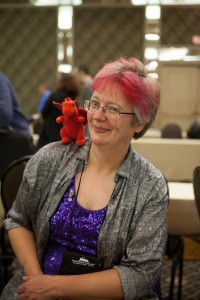

A short story is smaller, flatter, closer to two-dimensional, while a novel has at least four dimensions and probably much more than that. Things interconnect in a short story, but in a novel those interconnections become even more important, indeed are their own kind of building block. In a novel, things reflect, are doubled, made more complicated, imbued with meaning. So what’s the difference beyond that? For me, it’s what’s required in the writing, in getting enough of the book in my head to be able to figure out where it’s going next.
How does one achieve that? The answer that’s emerged for me is submersion. There needs to be — at least for me — a period where I’m focused on the writing to the exclusion of anything and everything else. To go to sleep with my words echoing in my head, to wake with dreams lingering in which pieces of the story have been predicted or deciphered. To not be watching television or playing videogames, which fills up my head with pop culture crap (I do not decry it in its place, simply claim that for a writer, too much can be detrimental.)
To work at novel length — at any length, really, though — is a willingness to let your unconscious wander and then capitalize in the rewrite on the wonderful things that process has revealed. You can’t hold a novel in your head the way you can contain a story, seeing it as a complete entity. Instead you exist within it, seeing outward, creating a hollow space in which the reader can live while experiencing the funhouse ride you have constructed.
I start with a roadmap that tells me the basic arc, but every few chapters I have to recalculate and check that map, and make sure no necessary sidetrips have presented themselves (or need to be dropped from the itinerary). I know by now, having completed five of these things, that I can reach the end. I just don’t know exactly how much gas it’ll take or what the terrain will present me with. That’s half the joy and most of the terror of this enterprise.
I don’t want to discount writers with a more straightforward plotting process — mileage will always, inevitably, vary and anyone who claims to have found the One True Way for anyone other than themself is full of hooey. Here’s a truth: all that matters is that you write. That you produce words of fiction rather than words about the art of fiction writing or the state of the world or the publishing industry or any of the ways in which the world has wronged you (a fascinating topic to you, but few others). This is not to say that critique and revision are not important as well, but simply that for either to take place, the act of creation must have preceded it.
I’m counting down the days till July because I’m taking a month and a half for submerging myself, heading off to housesit for a friend in another state. It’s what both my waking and unconscious mind are telling me to do in order to finish up this book and get a running start on the next, Exiles of Tabat. To dive deep into the roots of the story and blunder around, colliding with those hidden pillars, overgrown with metaphor and symbology, so semiotically-shagged that you must reach out for them with something like a special bat-sense, akin to sonar, because otherwise you’re just a blind man, holding onto an elephant’s tail and gravely expounding on how like a snake an elephant truly is.
Those pillars inform everything because they hold it all up. A story is just a story, a spaceship just a spaceship… but that’s not true at all, is it? In a novel, a spaceship’s cargo hold is packed tight with meaning: exploration, escape, the forces of technology, even fripperies like references to other fictional spaceships or science.
Things in books are more than just things, because even when we’re reading “just for entertainment,” there’s a level on which they show us what is and isn’t okay for humans to do. Everything is political in that it works to normalize (or mark as abnormal) what’s presented in it. A book with a protagonist preaching libertarian values or fondling her gun is just as political as any other viewpoint and to pretend such stories are not political is disingenuous or ignorant at best and outright dishonest at its worst.
But I digress, because I don’t want to talk about opinions of art, but rather what I can say about its creation. I’ll have wireless, so I’ll be teaching some classes, and there’s a few other things to do, but mainly I’m just going to write and write and see what I can get done. The book for sure, and a handful of stories that I’ve promised people, and at least an outline for Exiles. I am extremely lucky to have a spouse who doesn’t mind my heading off to hole up, as well as the economic circumstances to do this, and I am going to make the most of it, particularly in the post-Nebulas lull, because I’m itching to get the second book out there and see what people think, because it’s a weird structure, and man, the people who didn’t like the cliffhanger in the last are not going to be happy with this one.
Life’s been contentious lately, at least in the overall climate. If you want to feel happier, go do something nice for someone else. Give someone a kind word or a smile. And wish me luck, because today’s got a series of downers in it – but they are all quite survivable and July is coming soon.
...

And I’m really happy with it, but holy cow, is it hard to rewrite a novel. Because you’ve got to manage it all in your head while working with smaller parts of it.
I was trying to think of a comparison to make to Wayne, who is a software developer. And actually, it’s a lot like working on a large program with pretty of submodules and pieces, because when you change one section you need to figure out how it affects all the other pieces. And there’s repeated objects, or other things, and I think a little of those like global variables, so to have to make sure they’re declared before you can start using them. (As you can tell, I spent some procrastination time on thinking this out.)
Something I’m doing, which is probably rather insane of me, is that I transferred the book, which was in a Word doc, back into Scrivener. That’s because I have been severely reordering the scenes. I printed it all out, and went through that hardcopy with pen marking up some stuff and shuffling it around until it was all in the order I wanted it in.
Part of that is the process for dealing with what I’m comparing to global variables. That’s a thing that gets referenced more than once over the course of the book. Because you want it set up right the first time it appears and then for details to unfold about it in an order that makes sense and keeps building on the thing.
...
As I continue to explore new revenue streams for the upcoming year, I’m trying to add a bit more in the way of editing, since it’s one of the things I really enjoy doing, and which feels in some ways like an extension of the fiction.
So here’s my “Completed Nano? What Now?” package.
I will read your lump of words. And then I will give you feedback that includes:
Pricing:
Sign up by midnight PST, Friday, December 9 and get the special price: $79, which you can also claim if you’re a past or current student. Otherwise it’s $99. Contact me at spezzatura AT gmail.com
...
Want access to a lively community of writers and readers, free writing classes, co-working sessions, special speakers, weekly writing games, random pictures and MORE for as little as $2? Check out Cat’s Patreon campaign.

"(On the writing F&SF workshop) Wanted to crow and say thanks: the first story I wrote after taking your class was my very first sale. Coincidence? nah….thanks so much."



This site is protected by reCAPTCHA and the Google Privacy Policy and Terms of Service apply. This site is a participant in the Amazon Services LLC Associates Program, an affiliate advertising program designed to provide a means for sites to earn advertising fees by advertising and linking to Amazon.com.